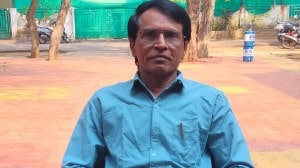The Love Hotel
Being a poet isnt easy even when you are surrounded by purple mountains wrapped in rains. The job would be especially difficult when the...
Stupid Cupid
Mamang Dai
Penguin
Pages: 155
Rs 199
Being a poet isnt easy even when you are surrounded by purple mountains wrapped in rains. The job would be especially difficult when the mountains belong to Arunachal Pradesh,the farthest corner of the wedge that is the Northeast,a region whose writings were neglected even during the boom of Indian writing in English. Yet,in 1980,before you heard the first unmistakable rumble of the big IWE bang,with Salman Rushdies Midnights Children,Mamang Dai left her job as an IAS officer she was the states first woman IAS officer to be the troubadour of Itanagar,to translate the language of her tribe for the rest of the land. In poems and stories,she decoded the songs and dances,myths and practices of the Adi community. In her latest,a slim volume called Stupid Cupid that is rather like a novella,Dai,52,follows a clutch of people as they leave the hills and meet furtively in the dusty plains of Delhi. Away from the laws of their land,the watchful collective eyes of a tribe,they fashion their own rules of love and rearrange their lives. For a very short while.
Adna is one of them. A beautiful aunt,whose adventurous love life was spoken of in hushed tones,bequeaths Adna a pretty property in posh South Delhi. She converts that into a caravanserai for lovers. Here amid lovely rose trellises,all intransigencies are condoned. Mareb leaves behind her husband and daughter to meet an old lover. Adna has her own secret love whose name is never let on. Stupid Cupid is about such loves and losses. And in their backstories,you get a glimpse of contractors clearing jungles and smashing mountains to drag roads across borders so that new settlements with new identities could spring up and of young boys chipping away at concrete steps for scrap metal to sell and buy drugs or glue or over-the-counter prescriptions that would give them a high.
But grand socio-economic themes are not Dais preoccupation. This is meant to be a light meditation on loves mutant forms,in delicate prose. The plot is deliberately underwhelming,the characters are diaphanous and the drama is reduced to the bare minimum to inward curses and arguments that are scarcely uttered. But underplaying a story,even one that just stretches to 150-odd pages,requires enormous skill. Dai seems distinctly out of sorts away from Arunachal Pradesh. While the images in her poems and stories gain from the landscape,its marvellous myths and age-old griefs,here,at the end,you are left holding a spectre of a story.
- 01
- 02
- 03
- 04
- 05































